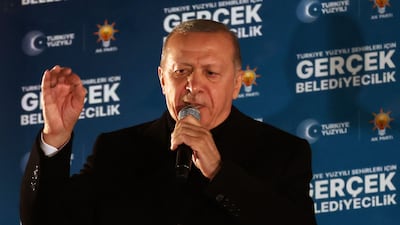Iraq is set to host Turkish President Recep Tayyip Erdogan on Monday in a visit that aims to promote greater co-operation between the two neighbouring countries.
Baghdad and Ankara have had strained relations since the 2003 US-led invasion that toppled Saddam Hussein’s regime.
Among the disagreements between the two nations are the decades-long Turkish military operation in northern Iraq against the Kurdish dissent group which Baghdad views as an infringement on the country’s sovereignty. Relations have also been strained over Iraqi demands for a fair share of water flowing to the Tigris and Euphrates rivers.
The two are set to sign several agreements to enhance relations and co-operation in different fields, Iraq’s National Security Adviser Qasim Al Araji said on Wednesday.
Mr Al Araji described the visit of Mr Erdogan as “significant”, and that he was “optimistic” about the meeting.
“Iraq is keen to solve all these issues and challenges and we have found a genuine and serious willingness from the Turkish side,” he said.
Mr Erdogan will start his one-day visit in Baghdad where he will meet Iraqi President Abdul Latif Rashid and Prime Minister Mohammed Shia Al Sudani before visiting Erbil, the provincial capital of the Kurdish region.
The Kurdistan Workers' Party, or PKK, has bases in northern Iraq, from which it has launched attacks against Turkey in an attempt to gain greater autonomy for the Kurdish people.
The conflict between the Turkish army and the PKK in Iraq escalated in the 1990s when Turkey launched several ground operations in northern Iraq after the 1991 Gulf War.
Ankara has launched several operations in Iraq against the group, which have been expanded in recent years.
PKK is designated as a terrorist group by the US and the EU. It took up arms against the Turkish state in 1984 with more than 40,000 people killed.
Last month, a Turkish delegation held talks in Baghdad. During the meeting, Ankara asked for greater co-operation in its fight against the PKK ahead of a military operation this summer, according to Iraqi officials.
The two sides hailed the talks as “productive” and Turkey welcomed Iraq’s move to designate the PKK as a “banned organisation”.

Another outstanding issue is Iraq's demand for a “fair and equitable” share of water from the Tigris and Euphrates rivers, which account for more than 90 per cent of its freshwater supply.
Both rivers originate in Turkey, while several tributaries from neighbouring Iran also feed the Tigris.
Turkey has built several dams on the rivers, while Iran has diverted the tributaries to its land.
For decades, Iraq has failed to agree with either country on how to ensure a fair share of water. Both argue that they, too, suffer from scarcity of water and that Iraq uses outdated irrigation methods.
“We have prepared the appropriate memorandum that will be included in the protocol that will be signed during the visit,” Minister of Water Resources Aoun Diab Abdullah said at the Sulaimani Forum adding that “it will be a step forward”.
His statement echoed those from Mr Erdogan last week, in which he said the water issue will be “one of the most important agenda items”.
“They [Iraqis] have made some requests regarding water, and we are working on these issues,” he said.
“We will make efforts to resolve this issue with them. They already want to resolve this matter. We will take steps in this direction.”
The discussion will also address other issues such as natural gas and oil flow to Turkey.
Baghdad and Ankara are at odds over oil exports from Iraq's northern Kurdish region through Turkey, the subject of a long-running dispute between the Iraqi federal government and the Kurdish regional government.
Last year, Turkey halted the flow of about 500,000 barrels a day through a pipeline from the Kurdish region after an arbitration ruling by the International Chamber of Commerce ordered Ankara to pay Baghdad damages for unauthorised exports between 2014 and 2018. No deal has since been reached to resume exports.
Turkey is one of Iraq’s main trade partners. In March last year, Mr Erdogan said that the volume of annual trade between the two neighbouring countries “broke the record” set in 2022, exceeding $24 billion.
Baghdad is also keen to have Ankara invest in the $17 billion infrastructure project known as the Dry Canal or Development Road. The proposed road and rail link will run from southern Iraq to Turkey, where it will connect to rail and road networks in Europe.


